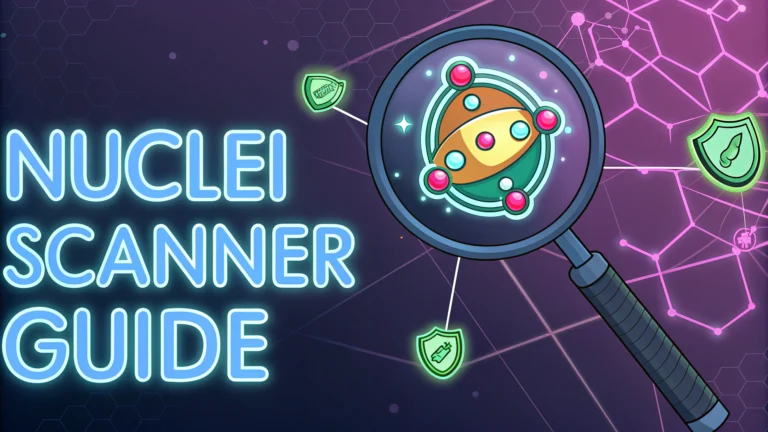Nuclei is a powerful open-source vulnerability scanner that automates security testing through customizable templates.
This quick guide shows you how to use Nuclei effectively for vulnerability scanning and penetration testing.
Installation
- Install Go 1.19 or higher
- Run:
go install -v github.com/projectdiscovery/nuclei/v2/cmd/nuclei@latest - Alternative: Download pre-built binary from GitHub releases
Basic Usage
Run a basic scan with: nuclei -u https://example.com
Common Scanning Options
-t– Specify templates to use-l– Scan multiple targets from a list-c– Set concurrent requests-o– Save results to output file
Template Management
- Update templates:
nuclei -ut - Download templates:
nuclei -tl - Custom templates directory:
nuclei -t path/to/templates
Performance Tips
- Adjust rate limiting with
-rlflag - Use
-bsfor bulk size control - Enable
-mefor maximum efficiency
Best Practices
- Start with low concurrency and increase gradually
- Use severity-based scanning (
-s low,medium,high,critical) - Implement proper exclusions with
-exclude-templates
Output Formats
| Format | Flag |
|---|---|
| JSON | -json |
| Markdown | -md |
| SARIF | -sarif |
Resources
- Official Documentation: https://nuclei.projectdiscovery.io
- GitHub Repository: https://github.com/projectdiscovery/nuclei
- Template Database: https://github.com/projectdiscovery/nuclei-templates
Remember to obtain proper authorization before scanning any target systems or networks.
Advanced Features
- Workflow support for chaining templates
- Custom DNS resolution
- Automatic rate limiting
- Proxy and authentication support
Customization Options
Authentication
-Hfor custom headers-auth-tokenfor API authentication-proxy-urlfor proxy configuration
Filtering
-tagsto filter by template tags-authorto filter by template authors-severityfor severity-based filtering
Integration Options
- CI/CD pipeline integration
- API automation capabilities
- Custom reporting modules
- Third-party tool integration
Conclusion
Nuclei provides a robust, flexible platform for security testing with extensive customization options. Its template-based approach and automation capabilities make it valuable for both security professionals and developers. Regular updates and a growing template database ensure continued effectiveness in identifying new vulnerabilities.
For optimal results, maintain updated templates, follow security best practices, and ensure proper authorization before scanning. Combine Nuclei with other security tools for comprehensive vulnerability assessment.
FAQs
- What is Nuclei Scanner and what is its primary purpose?
Nuclei Scanner is an open-source vulnerability scanner that automates security testing by using customizable templates to detect security vulnerabilities, misconfigurations, and security issues across web applications and networks. - How do I install Nuclei Scanner?
Nuclei can be installed using Go with the command ‘go install -v github.com/projectdiscovery/nuclei/v2/cmd/nuclei@latest’, or downloaded as a binary from the official GitHub releases page. - What types of vulnerabilities can Nuclei detect?
Nuclei can detect various vulnerabilities including SQL injection, Cross-Site Scripting (XSS), Remote Code Execution (RCE), misconfigurations, exposed panels, default credentials, and other security issues defined in its templates. - How do I create custom templates for Nuclei?
Custom templates can be created using YAML syntax, defining request methods, matching conditions, and extractors. Templates must follow Nuclei’s template syntax guidelines and can be stored in the ‘nuclei-templates’ directory. - What are the key components of a Nuclei template?
Key components include the template ID, info section (name, author, severity), requests section (HTTP methods, payloads), matchers (for identifying vulnerabilities), and extractors (for extracting specific information). - How can I run Nuclei against multiple targets?
Nuclei can scan multiple targets by providing a list of URLs in a file using the -l flag: ‘nuclei -l targets.txt -t templates/’ or by piping results from other tools. - What are the recommended workflow practices when using Nuclei?
Best practices include updating templates regularly, using rate limiting (-rl flag), implementing proper exclusions, running targeted template categories, and following responsible disclosure policies for findings. - How can I manage false positives in Nuclei scans?
False positives can be managed by using the -exclude flag to skip specific templates, implementing custom matchers in templates, and validating results manually before reporting. - What are the different severity levels in Nuclei templates?
Nuclei templates use severity levels including info, low, medium, high, and critical to classify the impact of vulnerabilities, helping prioritize remediation efforts. - How do I update Nuclei templates to the latest version?
Templates can be updated using the command ‘nuclei -update-templates’ which downloads the latest templates from the official nuclei-templates repository.








